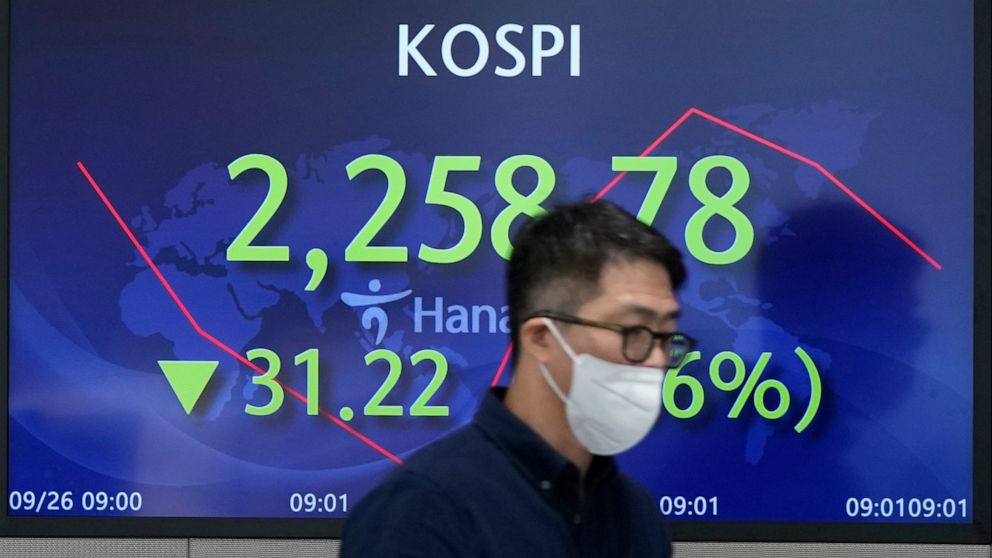Rate hikes, inflation tug Asian shares, British pound lower


TOKYO — Asian shares tumbled and the British pound sank further on Monday, reflecting pessimism over efforts by central banks around the world to curb inflation.
Japan’s benchmark Nikkei 225 shed 2.6% to 26,462.48. Australia’s S&P/ASX 200 dipped 1.5% to 6,479.30. South Korea’s Kospi dropped 3.1% to 2,219.75. Hong Kong’s Hang Seng gave up 0.5% to 17,851.36, while the Shanghai Composite lost 0.6% to 3,069.65.
The British pound’s slide against U.S. dollar picked up pace last week after the U.K.’s new government outlined plans to cut taxes and boost spending. The plan has has sparked concerns that increased public borrowing will worsen the nation’s cost-of-living crisis.
The pound dipped as low as $1.0349 per U.S. dollar early Monday but then rebounded to $1.0671, down 2.3%. It fell 3% on Friday.
The recent moves by the U.S. Federal Reserve and other central banks around the world to raise interest rates are designed to curb decades high inflation, but they also threaten a recession, if the rates rise too much or too quickly.
Wall Street ended last week with widespread selling, leaving major indexes with their fifth loss in six weeks. Data on European business activity was discouraging, and a separate report suggested U.S. activity is also still shrinking, though not quite as badly as in earlier months.
The S&P 500 sank 1.7% on Friday, to 3,693.23, its fourth straight drop. The Dow, which at one point was down more than 800 points, lost 486.27 points, or 1.6%, to close at 29,590.41. The Nasdaq fell 1.8% to 10,867.93.
Smaller company stocks did even worse. The Russell 2000 fell 2.5% to close at 1,679.59.
More than 85% of stocks in the S&P 500 closed in the red, with technology companies, retailers and banks among the biggest weights on the benchmark index.
Last week, the Fed lifted its benchmark rate, which affects many consumer and business loans, to a range of 3% to 3.25%. It was near zero at the start of the year. The Fed also released a forecast suggesting its benchmark rate could be 4.4% by the year’s end, a full point higher than envisioned in June.
In energy trading on Monday, benchmark U.S. crude fell 84 cents to $77.90 a barrel in electronic trading on the New York Mercantile Exchange. U.S. crude oil prices slid 5.7% Friday to their lowest levels since early this year on worries that a weaker global economy will burn less fuel.
Brent crude, the international standard, edged down 87 cents to $85.28 a barrel.
The recent rise in the U.S. dollar against other currencies is a concern for many countries. It dents profits for U.S. companies with overseas business, and puts a financial squeeze on much of the developing world.
When the dollar approached 146 yen last week, the Japanese government and the Bank of Japan intervened. The dollar has been trading at about 143 yen since then.
It edged up Monday to 143.90 Japanese yen from 143.32 yen late Friday. The euro cost 96.32 cents, down from 96.88 cents.
———
Yuri Kageyama is on Twitter https://twitter.com/yurikageyama
[ad_2] File source



